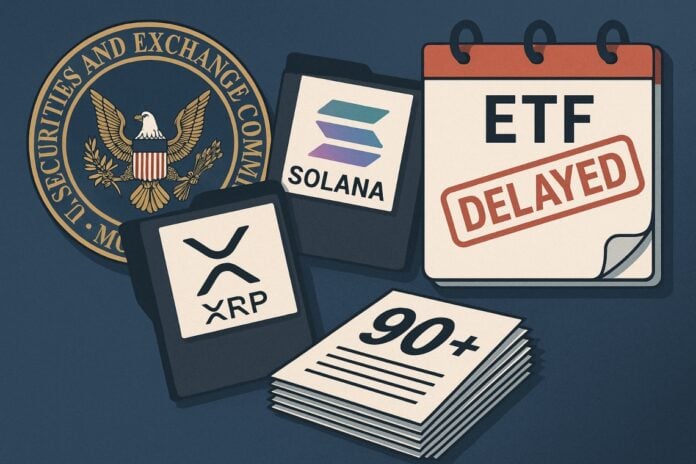Strategic Deferral by the SEC on Solana and XRP ETFs: the Commission has chosen to take more time.
Franklin Templeton has obtained an extension until November 14, 2025, using the maximum extension authority provided by the regulations, while the amendment on staking for BlackRock’s iShares Ethereum Trust has been postponed to October 30, 2025.
Meanwhile, the crypto product backlog awaiting approval has exceeded 90 requests, as reported by market analysis and report-specialist Bloomberg Intelligence, reigniting the discussion on listing rules and market timing.
According to the data collected by our research team on public filings between March and September 2025, the most frequent extensions concern files that include on-chain components (staking or conversion from trust to ETF).
Our analysts note that the SEC is focusing its reviews primarily on custody and surveillance-sharing criteria: in the monitored cases, the additional reviews have generally extended the timelines by 45–60 days compared to the initial deadlines.
Summary
SEC: postponement for Franklin Templeton and for BlackRock’s ETH staking
The Commission has applied the maximum calendar extension allowed, postponing the decision on the ETFs proposed by Franklin Templeton on Solana and XRP to November 14, 2025.
In this context, for BlackRock, the SEC has added 45 days to the timeline of the amendment on the staking of the iShares Ethereum Trust, setting the new deadline to October 30, 2025.
- The applications by Franklin Templeton, filed on the Cboe BZX for products on Ethereum, Solana, and XRP, date back to mid-March 2025.
- The Nasdaq submitted the amendment on staking for the iShares Ethereum Trust on July 16, 2025 (Nasdaq – Rule Filings).
- The extensions are included in the procedure provided by Section 19(b) of the Securities Exchange Act, which governs market rule changes.
The reasons for the postponement: technical time and regulatory assessments
In their respective orders, the SEC stated that it needs “sufficient time to consider” the proposals (SEC – SRO Filings).
That said, the passage reflects the need for further analysis on the monitoring of market surveillance, investor protection, and operational risks. The postponement also allows for coordination of any interventions on listing standards and market surveillance criteria, reducing margins of procedural uncertainty.
Backlog and Approval Prospects: The Updated Framework
Extensions, although not equivalent to a refusal, are part of the regulatory practice for more complex dossiers. It must be said that the context is marked by a domino effect of requests with:
- Backlog crypto ETF: over 90 applications pending review, as reported by Bloomberg Intelligence, snapshot from August 29, 2025.
- Grayscale Hedera Trust: whose new term has been postponed to November 12, 2025 (SEC – SRO Filings). Also consider the internal news Hedera BlackRock ETF: a historic operation.
- Other recent delays concern proposals such as the Bitwise Dogecoin ETF, the Truth Social Bitcoin & Ethereum ETF, and various dossiers on XRP, Dogecoin, and Litecoin with deadlines distributed between October and November 2025 (SEC – SRO Filings).
Regarding the approval probabilities, analysts from Bloomberg Intelligence have estimated a range around 90–95% for Solana and XRP, while on predictive markets like Polymarket the odds for a Solana ETF have reached 99% at certain stages.
However, these percentages remain indicative and cannot predict the definitive outcome of the regulatory assessment.
Timeline and hypotheses for new “generic listing standards” for crypto ETFs
Each ETF follows a regulatory process under Section 19(b) that can extend up to 240 days. In summary:
- Phase 1: deposit and publication in the Federal Register.
- Phase 2: first 45 days dedicated to comments and analysis.
- Phase 3: further extensions (45 + 90 + 60 days) up to the overall limit of 240 days.
In parallel, exchanges like Cboe and NYSE have proposed generic listing standards to allow the listing of certain crypto ETPs without a case-by-case review, provided predefined criteria (such as liquidity, custody, and surveillance-sharing) are met.
If approved, these standards could accelerate the introduction of more products to the market in quick succession. Indeed, discussions are currently underway, with an outcome hoped for around the beginning of October 2025 (timing subject to official confirmation).
Staking on Ethereum: details and positions of the managers
BlackRock has argued that Ethereum ETFs are incomplete if not integrated with staking functionalities, capable of generating an on-chain yield to be redistributed to the fund (SEC – SRO Filings).
The topic is the subject of a technical discussion with the SEC, including a meeting with the Crypto Task Force held on May 10, 2025 (meeting memo and technical materials to be verified).
Meanwhile, Grayscale and 21Shares are also keeping applications open for ETFs that include staking functionalities and conversions from trusts to ETFs on various altcoins (see also 21Shares Launches DYDX ETP: New Opportunities).
In parallel, BlackRock manages BUIDL, a tokenized Treasury fund with assets under management estimated at 2.9 billion dollars according to market reports and notes (data to be confirmed through official statements).
The operation of on-chain products fuels the debate on how to integrate native functions, such as staking, into regulated vehicles.
What Changes for Investors
- Timing: until the new deadlines of October and November 2025, a stand-by phase is expected, with regulatory updates in blocks.
- Narrative volatility: SEC announcements, exchange comments, and anticipations related to filings could influence sentiment in the short term.
- Alternative scenario: the adoption of generic standards could lead to a series of close approvals, impacting liquidity and market making activities at the debut (The problem of market making in the crypto sector).
- Operations: it is advisable to monitor the official pages of the SEC – SRO, the comment letters, and the regulatory orders to follow any changes and further requests.
Quick Clarifications
- The postponement does not equate to a rejection: it is a procedural extension aimed at completing technical and regulatory assessments.
- Deadlines may be subject to further changes: the SEC can in some cases expedite decisions or impose additional orders following the comments received.
- Accelerating factors: the adoption of generic standards or a coordinated decision for multiple products of the same asset class could streamline the approval process.




